Permanent magnets are a key technology for modern society with applications in air conditioning, mobility or power generation. The measured coercive fields in modern permanent magnets reach only a small fraction of the theoretical values. A series of experimental studies have shown that discontinuities and misalignment at the atomic scale significantly affect the macroscopic coercivity. In this project, we develop a quantitative theory of coercivity, taking into account the local atomic structure, the spatial variation of the intrinsic magnetic properties, and the physical microstructure of the magnet. To achieve this goal we bridge the length scale between ab-initio simulations, atomistic spin dynamics and continuum micromagnetic simulations. Atomic defects at interfaces and grain boundaries will be considered already at the smallest possible length scale, the unit cells of the material composition. The developed theory is guided by well described magnetic materials to validate the system throughout the progress of the project.
News
The Special Semester on Computational Methods for Electric Machines will be held at the Johann Radon Institute for Computational and Applied Mathematics (RICAM) from October 6 to December 12, 2025. A workshop on Magnetic Material Modelling is taking place from November 24 to 28. Alexander Kovacs, Markus Gusenbauer and many others from the community will contribute to the workshop.
The Joint European Magnetic Symposia (JEMS2025) took place in Frankfurt from August 24 to 29. Researchers from around the world presented their latest findings.
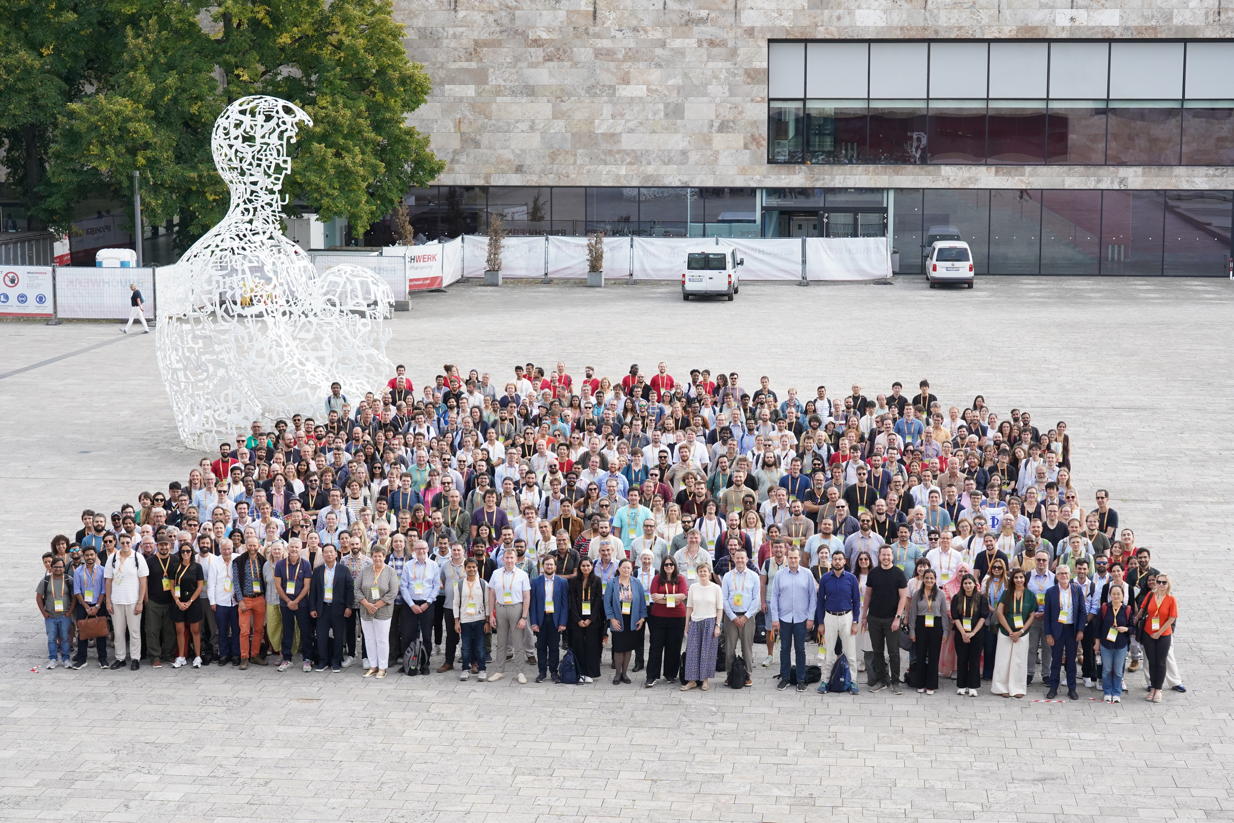
Alexander Kovacs gave a talk with the title:
Effect of interface on magnetic exchange coupling in Co/Ru/Co trilayer: from ab-initio simulations to micromagnetics
Kovacs, A. (Speaker)¹; Arapan, S.²; Böhm, D.¹; Gusenbauer, M.¹; Legut, D.²; Oezelt, H.¹; Priessnitz, J.³; Schrefl, T.¹
¹University for Continuing Education Krems, Wr. Neustadt (Austria); ²VSB - Technical University of Ostrava; ³Max Plank Institute for Physics of Complex Systems, Dresden
Interfaces play a substantial role for the functional properties of structured magnetic materials and magnetic multilayers. Modeling the functional behavior of magnetic materials requires the treatment of the relevant phenomena at the device level. Properties predicted from the electronic structure and spin dynamics at the atomistic level have to be properly transferred into a continuum level treatment. In this work we show how Cobalt(Co)/Ruthernium(Ru)/Co trilayers can be simulated with the continuum theory of micromagnetism, with interface coupling energies and bulk intrinsic properties derived from the results of ab initio and spin dynamics simulations at different temperatures.
We demonstrate a workflow in which ab-initio calculations give the exchange energy between atom pairs across a Ru interface Jint ,the bulk exchange stiffness at zero Kelvin from exchange energies Jij, and anisotropy energy per atom. Atomistic spin dynamic simulations use the exchange energies Jij , Jint , and the anisotropy energy per atom to solve the Landau-Lifshitz-Gilbert equation for classical spins at fixed atom sites under different temperatures, to extract temperature dependent domain wall widths. With this, we gain insight into the temperature-dependent intrinsic material properties, namely saturation magnetization, magnetocrystalline anisotropy constant, and exchange stiffness constant for bulk Co. We micromagnetically compute the magnetization configuration accross the Ru interface for different temperatures. Using the angular variation of the magnetisation we derive an expression to determine the temperature-dependent micromagnetic exchange coupling strength between two Co sites separated by a Ru interface.
From May 21st to 22nd 2025, Markus Gusenbauer, Alexander Kovacs, and Harald Özelt participated in the international workshop “Permanent Magnet Materials in the Making” at the Erich Schmid Institut (ESI) in Leoben, Austria. The event brought together researchers from Austria, Germany, Italy, Slovenia, and Spain to exchange insights on the latest developments in permanent magnet materials and explore future collaboration opportunities. In addition to project presentations and discussions, participants were also introduced to the card-based method as a tool for interdisciplinary engagement. Many thanks to the organizers, Andrea Bachmaier (WPI c/o ESI, ÖAW) and Erika Faigen (University of Vienna), for fostering such a productive and inspiring environment!

From February 9-12, 2025, the 2025 IEEE Conference on Advances in Magnetics took place in Bressanone, Italy (www.aim2025.it). Alexander Kovacs coordinated and chaired the session “Artificial Intelligence, Machine Learning and Soft-Computing for Magnetism” together with Antonino Laudani.
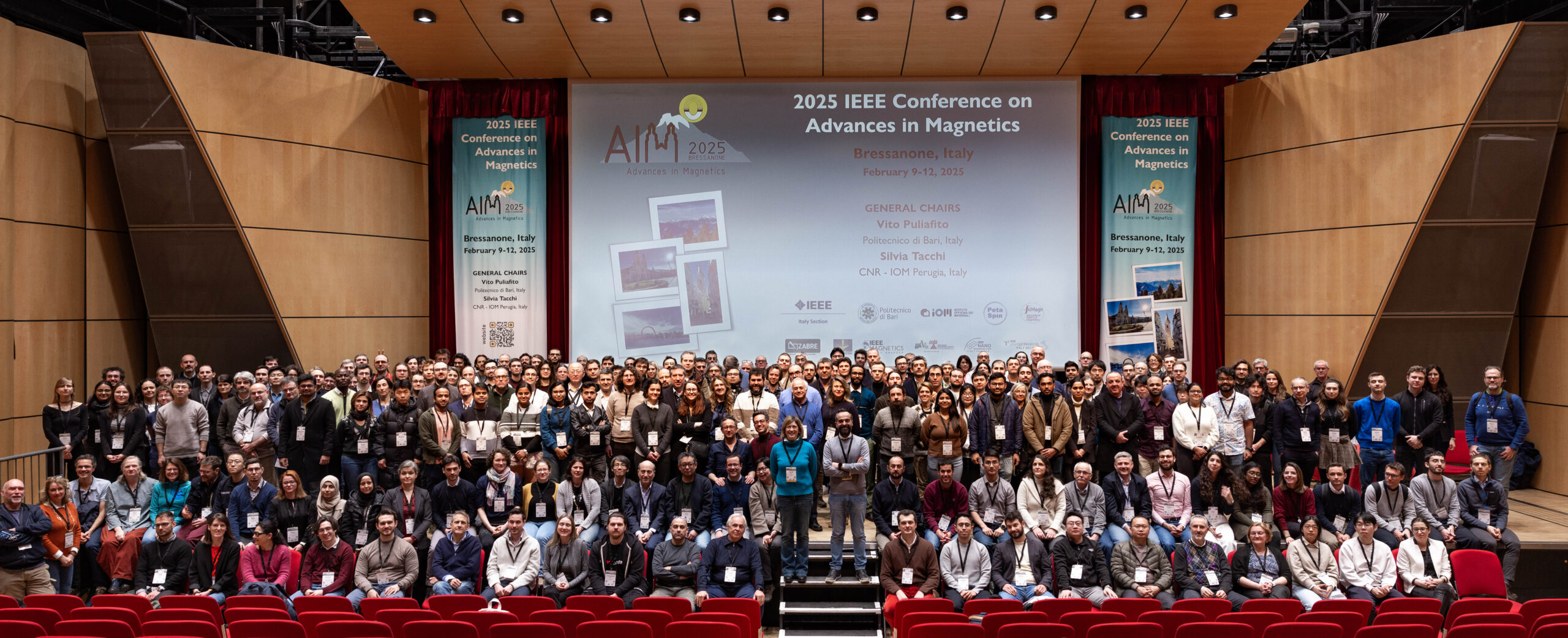
Alexander Kovacs is presenting the work on “Micromagnetic investigation of interface coupling and microstructure on magnetic equilibrium states and saturation of CoRuCo multilayer systems” at the Materials Science and Engineering Congress 2024 (MSE2024), which is held in Darmstadt from 24th to 26th September, 2024. It is a follow up on the ICM2024 contribution. In previous work the magneto-crystalline anisotropy is averaged throughout the layers. This work investigates this assumption with micromagnetic simulations by introducing a deviation in the magneto-crystalline easy-axis distribution applied to the setup. For more details click to see the full abstract.
On the 3rd of July Alexander Kovacs presented the work “Micromagnetic simulation investigation of micro-structural influence on magentic equilibrium states in ultra-thin hcp Co films” at the International Conference on Magnetism 2024 (ICM2024) in Bologna. Micro-structural parameters are an important factor when it comes to magnetization reversal and therefore this influence is important for macroscopic magnetic properties as well. Further investigation will look at exchange coupled multi-layers and their initial hysteresis curve matching exchange stiffness computed by ab-initio calculations with experimental initial hysteresis curves.
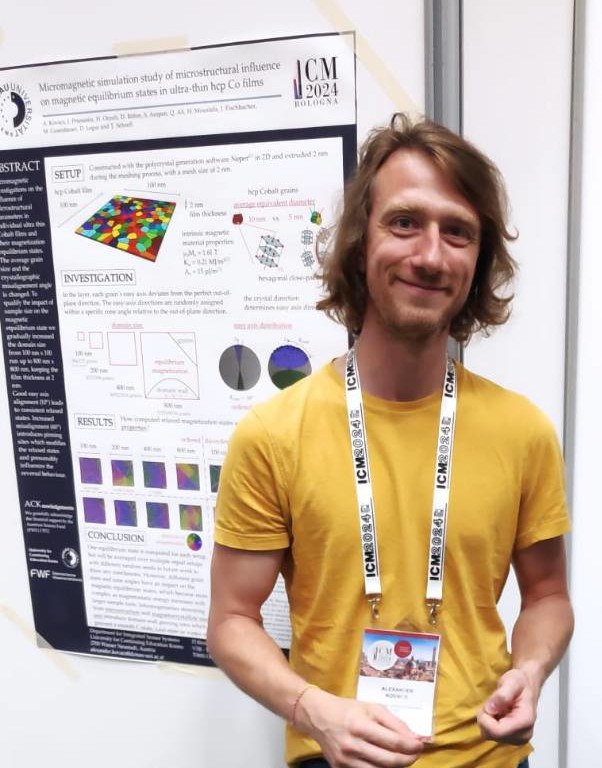
On May 24, 2024 from 17:00 to 23:00, the Long Night of Research took place throughout Austria. At the University for Continuing Education Krems we were represented with the topic: "Clean technologies thanks to artificial intelligence: Who can find the strongest magnet?". The guests were able to actively participate in the research by drawing different phase distributions and crystal structures of magnets. A trained AI evaluated the drawings and predicted the performance of the magnets. In the discussion, we were able to demonstrate the necessity of magnetic research in a wide range of topics for a sustainable and climate-friendly energy transition.
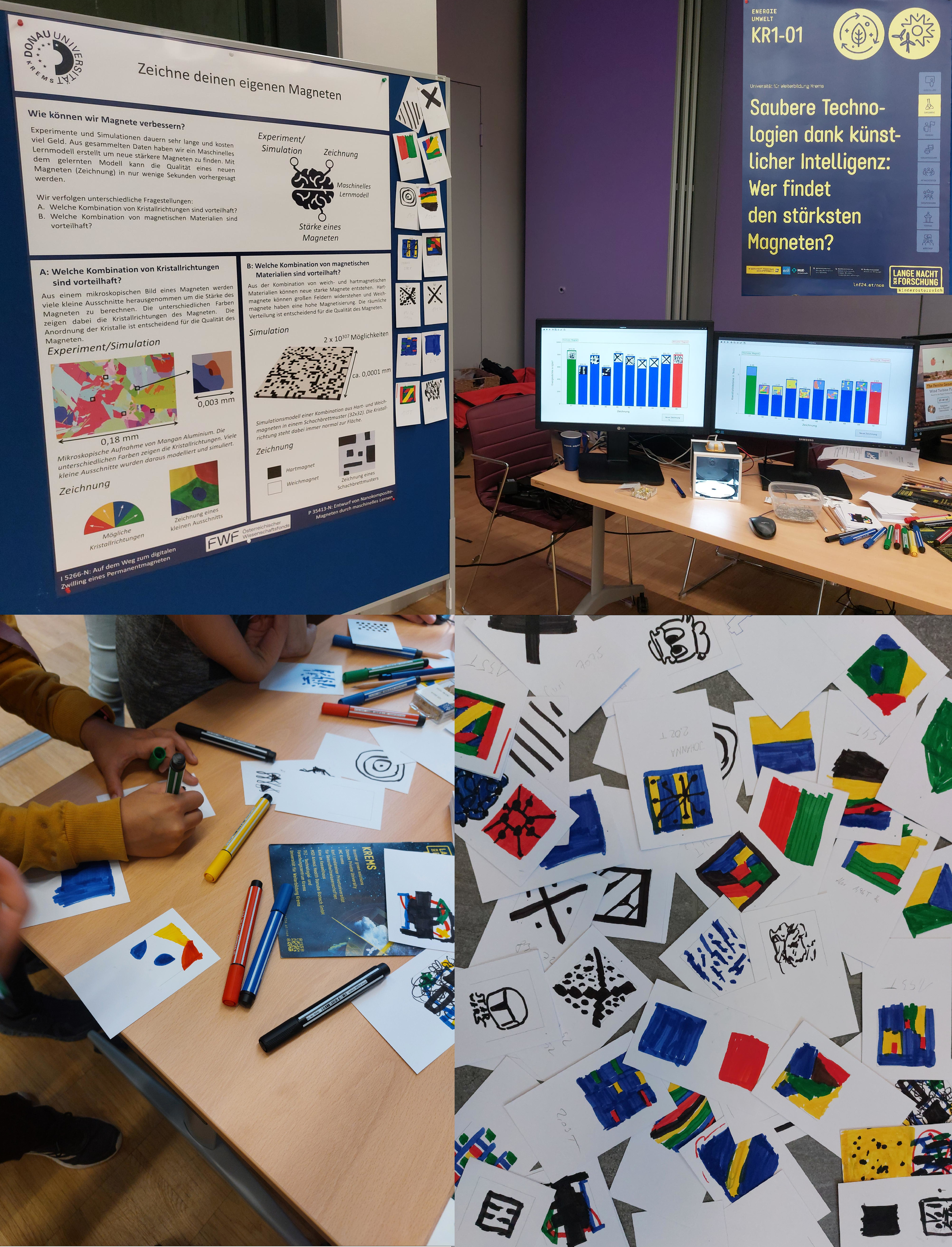
The 13th International Symposium on Hysteresis Modeling and Micromagnetics (HMM 2023) was held in Vienna from June 4-7,02023 (www.asc.tuwien.ac.at/hmm2023). For the project, Alexander Kovacs presented a poster entitled “Finite Hex Element Adaptive Mesh Refinement of Demagnetizing Field Computation”.
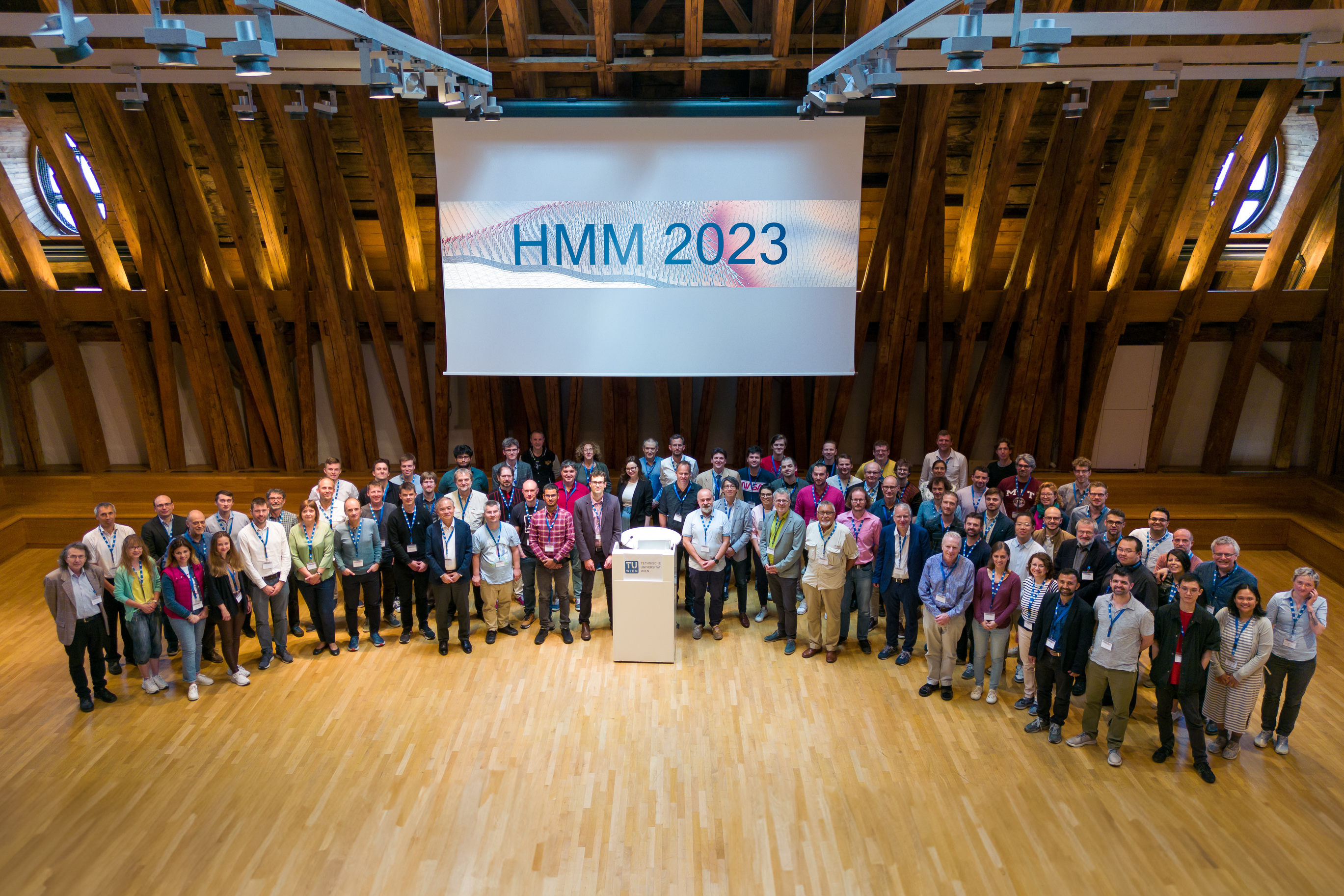
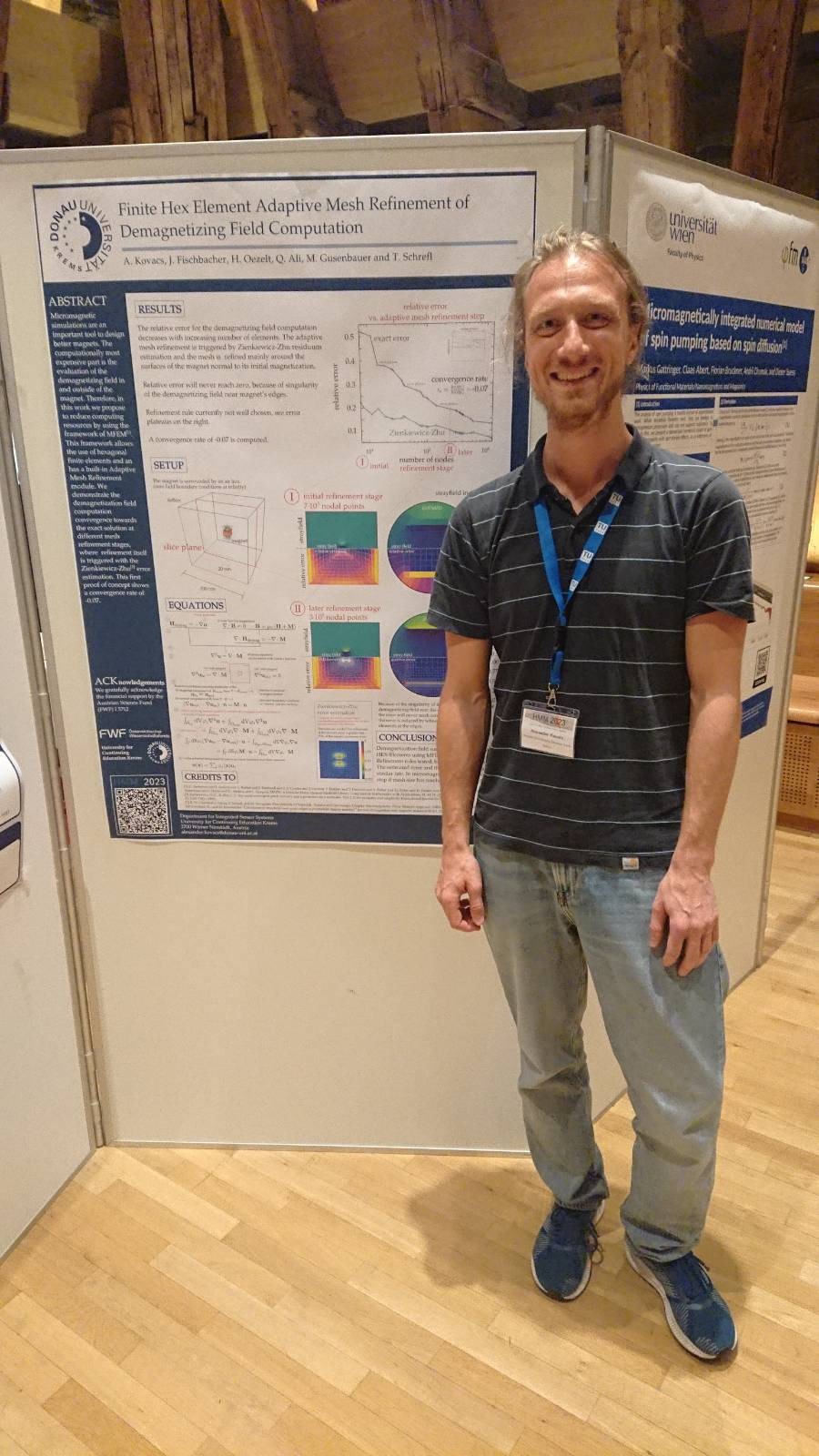
Our project partners from Ostrava were also represented with a poster entitled "The role of the interface and ferromagnetic alloying on the interlayer exchange coupling". We used the symposium for a joint project meeting. Participants from our department were Alexander Kovacs, Thomas Schrefl and Markus Gusenbauer. Our colleagues from Ostrava were represented by Dominik Legut and Sergiu Arapan. We gave each other an update on ongoing developments and discussed upcoming steps. We also planned a visit from two experts, Erol Girt from Simon Fraser University in Canada and Hossein Sepehri-Amin from the National Institute for Materials Science in Japan, who provide important experimental input for our joint project.
On May 11, 2023 the talk "Multiscaling strategies in computational magnet design" was presented at the "Going Green CARE INNOVATION 2023" in Vienna (www.careinnovation.eu) . Thereby parts of the project could be presented to a larger audience. The program included the latest developments in circular economy, clean production, resource efficiency, climate change and much more, presented by leading experts from industry, academia and the public sector from around the world. The talk was presented as part of a joint workshop titled "Interdisciplinary team up to escape the rare earth trap." The team consists of the Erich Schmid Institute of Materials Science of the Austrian Academy of Sciences in Leoben, the Johannes Kepler University Linz and the University for Continuing Education Krems. The idea of the workshop was the connection of material scientists, engineers and social scientists to gain benefit from interdisciplinary collaborations for finding the most sustainable solutions for magnetic material design.
Alexander Kovacs presented the work on “Recent activities on the applications of machine learning in micromagnetics” as an invited talk at IEEE Advances in Magnetics (AIM2023), 17/01/2023, in Moena (Italy). In parts of the talk he showed our proposed multiscale approach which computes and predicts chemical concentrations and atomistic structures to intrinsic magnetic properties and further on coercivity of single multi-phase grains.
On July 13, 2022, we organized a workshop at the Junge Uni on the Krems campus. Children between the ages of 10 and 13 learned about how an electric motor works. They were able to make a small electric motor and experience how the strength of a magnet affects the power of a motor. Thomas Schrefl, Harald Özelt and Markus Gusenbauer were the supervising researchers at the workshop.
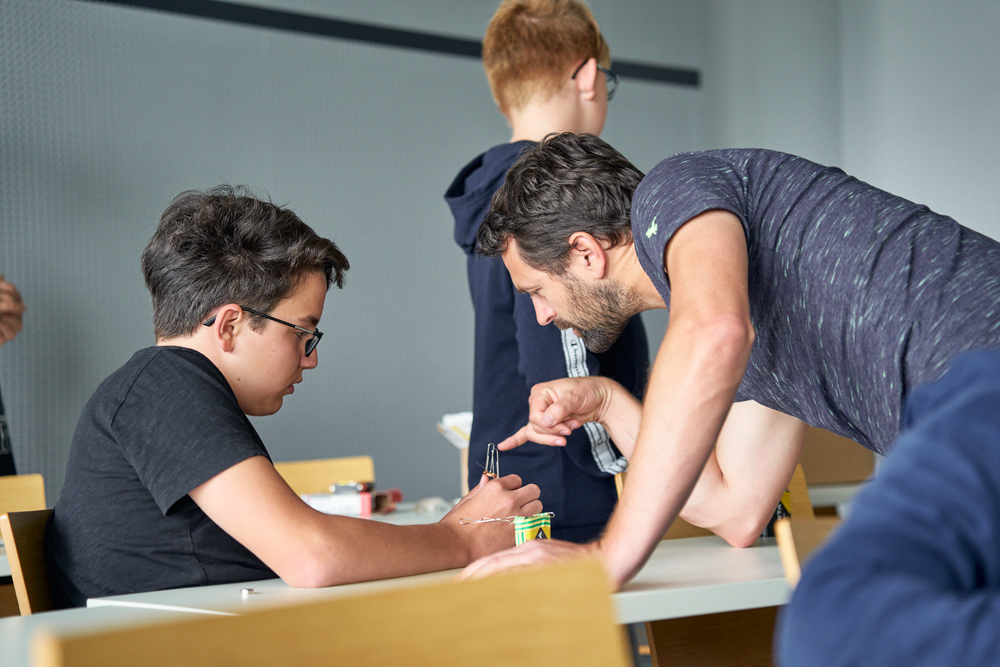
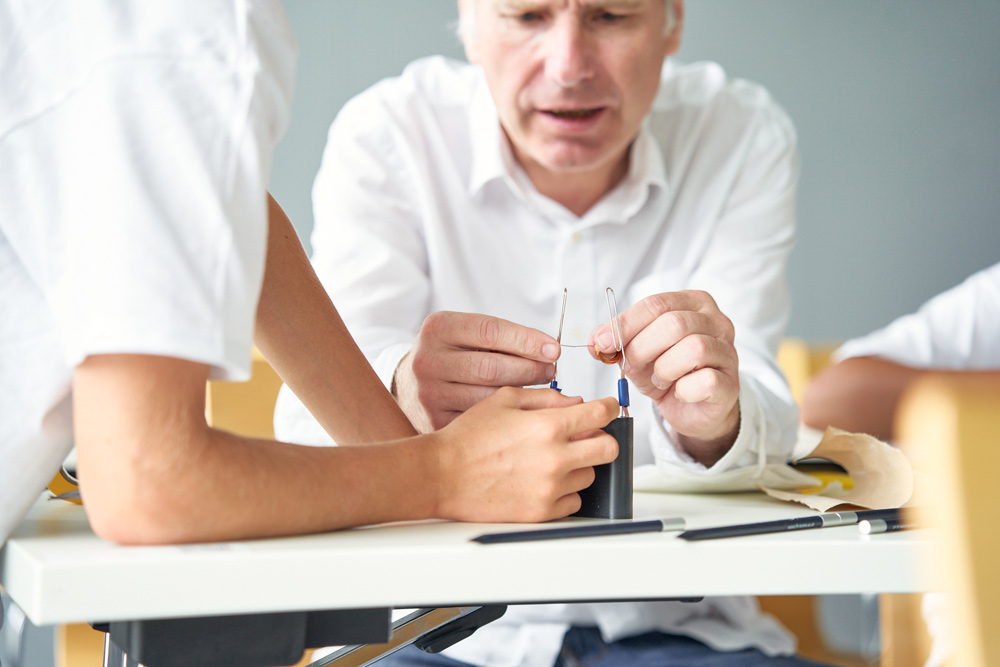
The first kick-off meeting took place on July 4, 2022 in Krems. Participants were Dominik Legut and Sergiu Arapan from TU Ostrava, Czech Republic. And from Krems, Thomas Schrefl, Markus Gusenbauer, Harald Özelt, Alexander Kovacs and Qais Ali were represented. There was also a guest researcher from Ukraine, Dr. Oleksandr Hrushko. Among the topics discussed were the first phase of the project, in which we are focusing on the Fe/Ni material combination and implementing the adaptive grid for the microstructures of the simulations. We also discussed the possibility of linking the characterization of the mechanical properties of magnets to the project. Afterwards, a social evening took place at a local “Heuriger” with a view to the Danube.
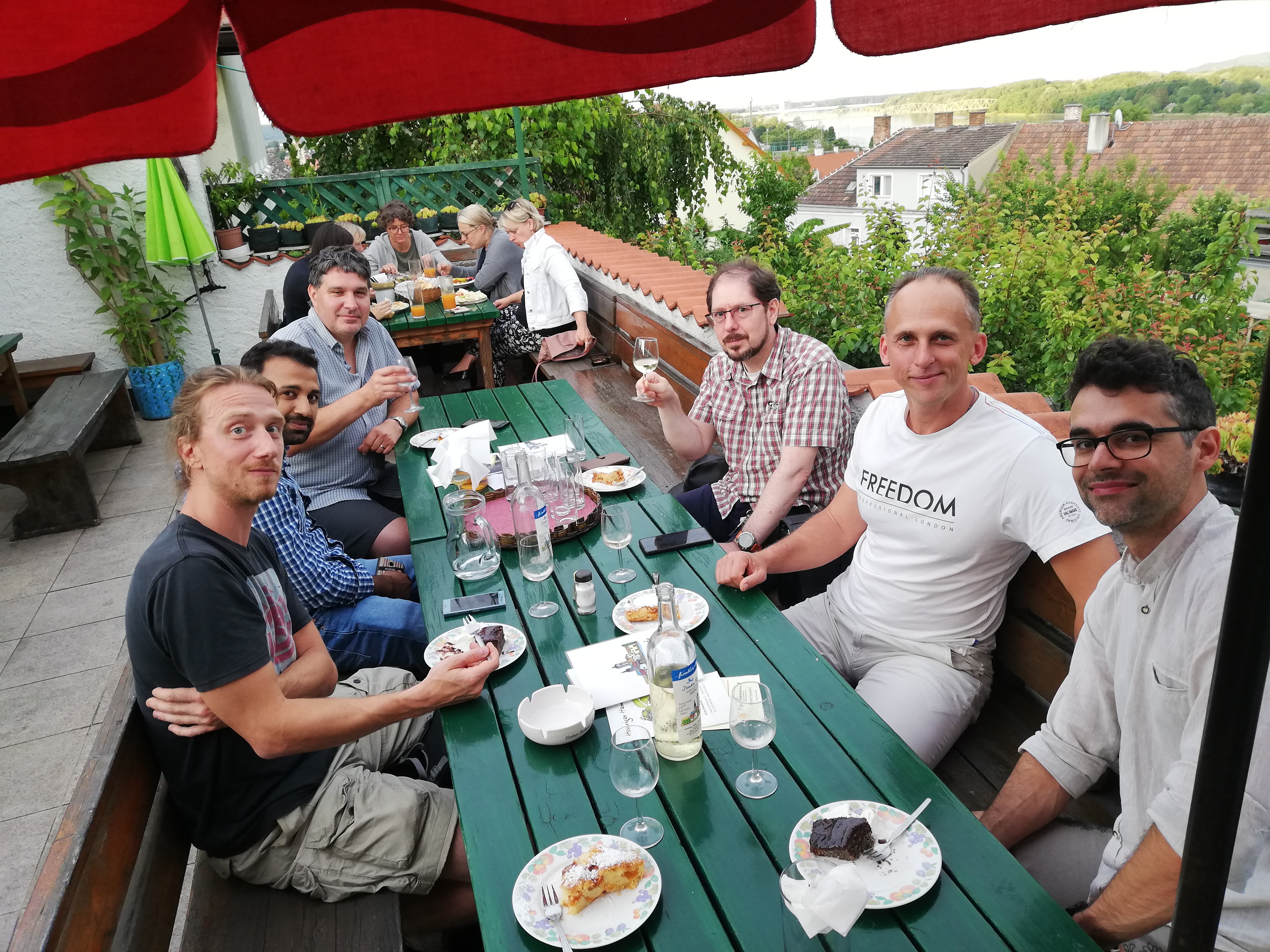
On May 20,2022 we were able to inspire young and old at the Long Night of Research 2022. The influence of permanent magnets on electromobility was demonstrated at a hands-on station. Those interested were able to find out how magnets influence the performance of electric motors with simple experiments. With our project we were able to show how important it is to develop permanent magnets without critical rare earths materials.
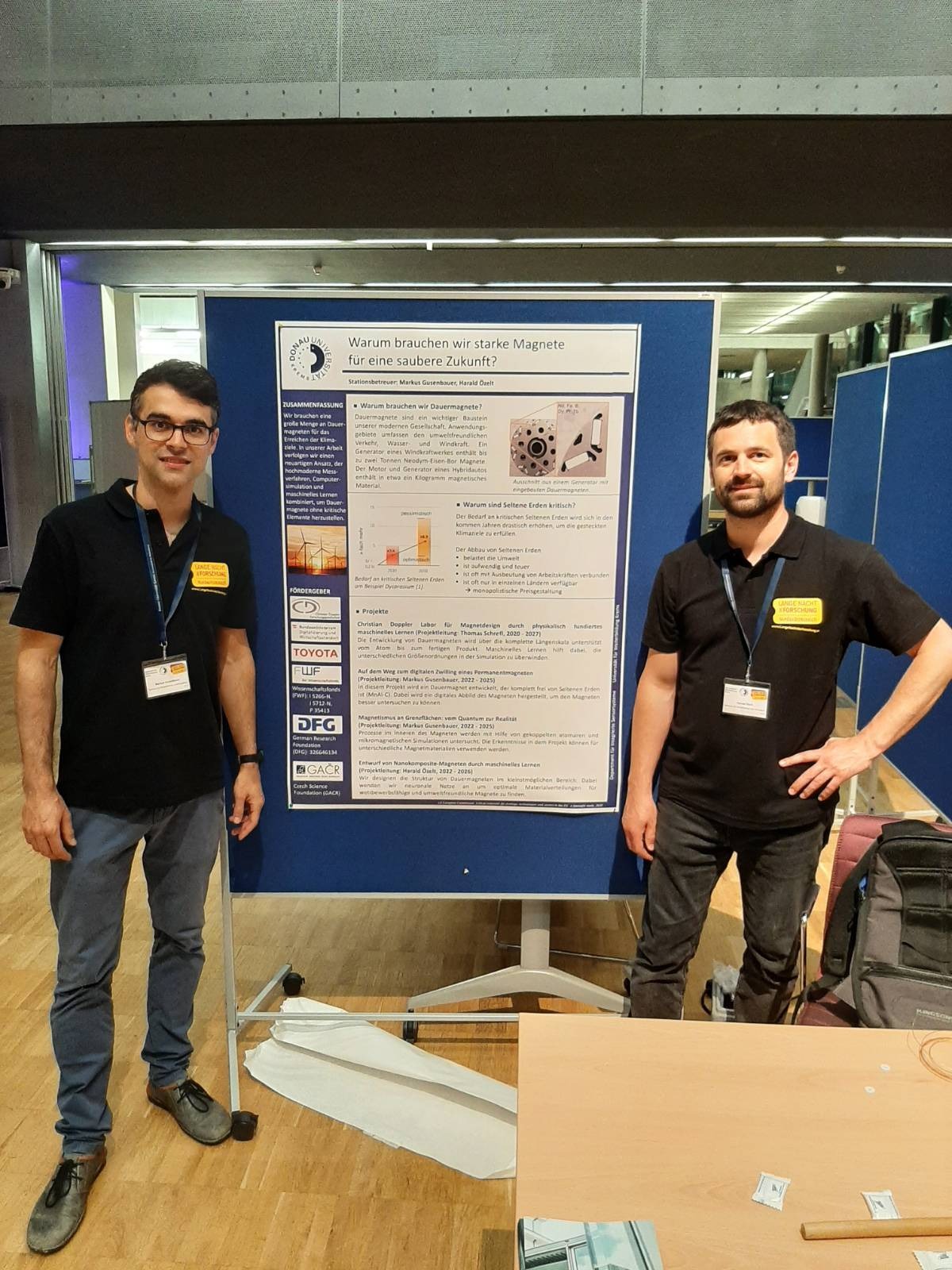
https://www.donau-uni.ac.at/de/aktuelles/veranstaltungen/2022/lange-nacht-der-forschung-2022.html
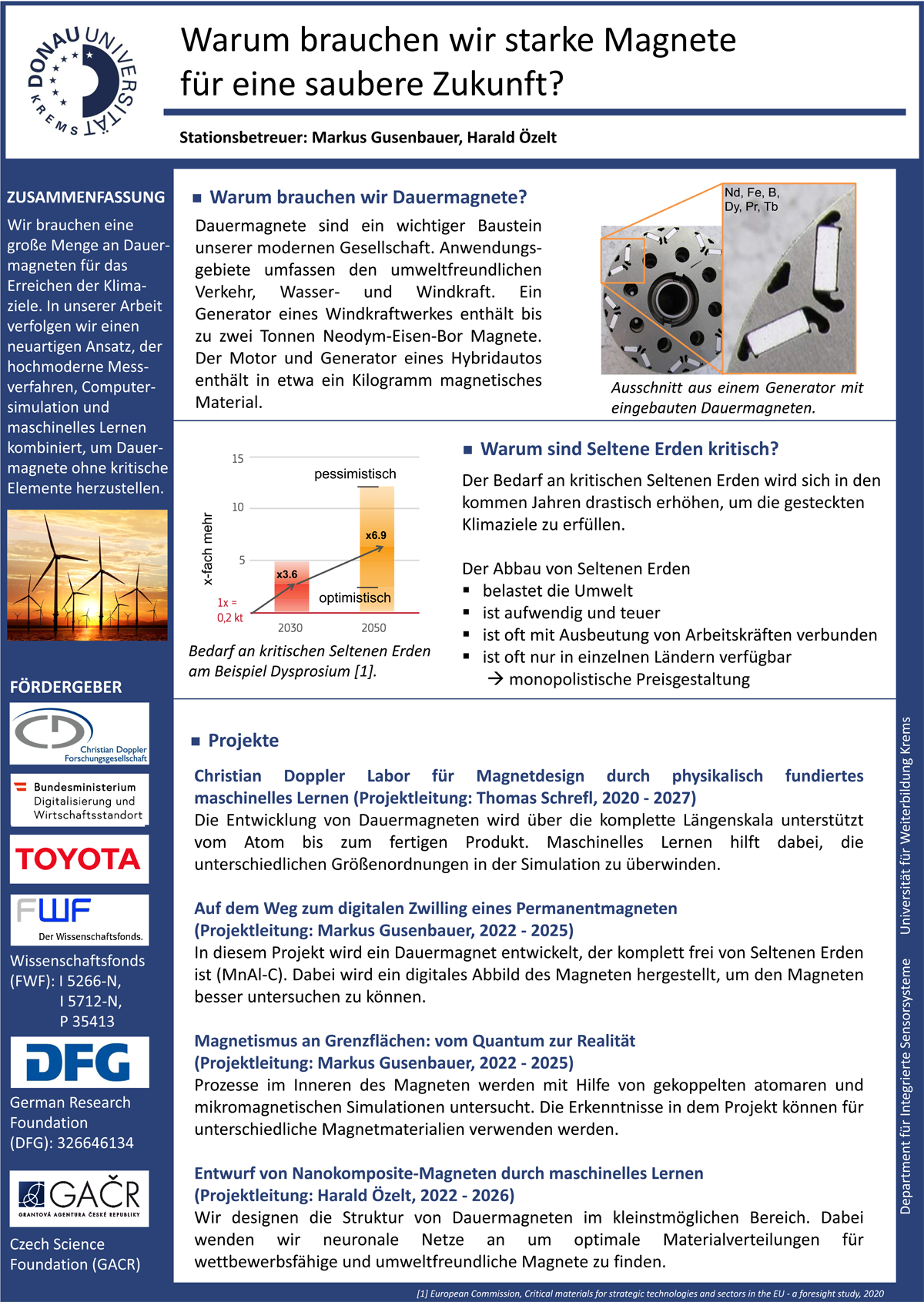
@ Details:
Auftraggeber:
FWF Projekt: I I 5712-N

Details
| Duration | 01/11/2022 - 31/03/2026 |
|---|---|
| Funding | FWF |
| Program | |
| Department | |
| Principle investigator for the project (University for Continuing Education Krems) | Dipl.-Ing.(FH) Dr. Markus Gusenbauer |
Publications
Arapan, S.; Priessnitz, J.; Kovacs, A.; Legut, D.; Oezelt, H.; Böhm, D.; Gusenbauer, M.; Schrefl, T. (2026). Effect of interface on magnetic exchange coupling in Co/Ru/Co trilayer: From ab initio simulations to micromagnetics. Applied Surface Science Advances, Vol. 31: 1-11
Liu, J. P.; Mohapatra, J.; Joshi, P.; Abbas, H.; Gusenbauer, M.; Bian, K.; Lu, P.; Fan, H.; Schrefl, T. (2025). Superstructure magnetic anisotropy in Fe3O4 nanoparticle chains. Nature Communications, Vol. 16:5723: 1-9
Kovacs, A.; Fischbacher, J.; Oezelt, H.; Ali, Q.; Gusenbauer, M.; Schrefl, T. (2023). Finite Hex Element Adaptive Mesh Refinement of Demagnetizing Field Computation. In: HMM, proceedings in 13th International Symposium on Hysteresis Modeling and Micromagnetics (HMM 2023): 1, HMM, Wien
Lectures
Effect of interface on magnetic exchange coupling in Co/Ru/Co trilayer: from ab-initio simulations to micromagnetics
JEMS2025, 26/08/2025
Image-based prediction and optimization of hysteresis porperties of nanocrystalline permanent magnets using deep learning
HMM2025, 26/05/2025
Micromagnetic investigation of interface coupling and microstructure on magnetic equilibrium states and saturation of CoRuCo multilayer systems
MSE 2024, 26/09/2024
Micromagnetic simulation study of micro-structural influence on magnetic equilibrium states in ultra-thin hcp Co films
International Conference on Magnetism, 04/07/2024
Experiments and simulations for physics-informed machine learning to design nedoymium-iron-boron permanent magnets
Joint European Magnetic Symposia (JEMS 2023), 31/08/2023
Recent activities on the applications of machine learning in micromagnetics
IEEE Advances in Magnetics (AIM2023), 17/01/2023

